After Years of Fertility Struggles I Had a Baby—and Then Twins 7 Weeks Later
M.M.LaFleur founder and CEO Sarah LaFleur shares her long, difficult, and surprising journey to parenthood.
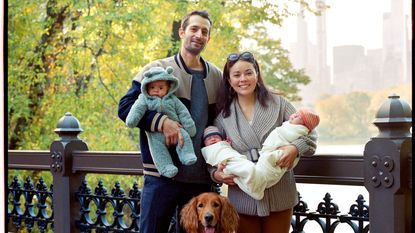

I've been with my husband, Chris, since our senior year of college. Most of our 20s was spent thinking about our careers—honestly, we didn't even think about each other. We lived together, but I was working some really tough corporate jobs where the only hours you're not at the office are the hours you're sleeping. He was in a pretty similar space. So most of our 20s we were heads down, just doing that.
Financially, I wasn’t saving any money at the time and constantly felt stretched. The thought of adding another person to the list of people we would have to take care of seemed impossible. It really wasn't until our 30s that we even started thinking about kids. We got married at City Hall in 2015, and then it took another two years to throw a proper wedding party. I remember thinking, Oh my gosh, I need to be careful not to get pregnant because I don't want to be pregnant at my wedding party. In my head, it was this thing where we would have sex a couple of times, and then boom, I’m pregnant.
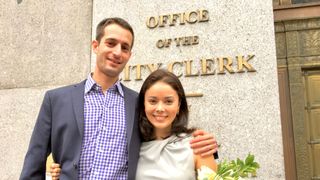
Sarah and Chris at their City Hall wedding in 2015.
We had the wedding party in July in Hiroshima in 2017 and when we came back to the U.S., we were like, "Okay, let's really think about this kid thing." At that point, my company, M.M.LaFleur, had done its Series-B and it felt like we were on good financial footing. I was finally able to save a little bit of money.
A very close girlfriend of mine started seeing a fertility specialist at the time. I think she and her husband had been trying for about a year, and she said, "You know, there were some things I wish I knew in the beginning." She got diagnosed with PCOS. "I didn't know that until basically a year in,” she told me. “And I just wonder, had I seen a specialist first, could I have addressed this earlier?"
So I went to Fertility Clinic #1. The doctor kind of laughed, like, "How long have you been trying?" And we said, "Oh, we haven't been." And he was like, "Please go try for six months, and if you're still not pregnant, come and see me." But he added, "If you really want to run some basic tests, we can do that."
We felt like well, we're here, might as well. So we did some blood work, and all of that came back normal. There was one test that he wanted me to do at another office, a hysterosalpingogram (HSG), which tests for blocked fallopian tubes. That machinery is honestly the scariest thing I have ever seen. It felt like a scene out of the Handmaid's Tale—you put your feet into these leg suspender things, and then they lock it down. You're just like, What am I in for?

"I remember thinking, Oh my gosh, I need to be careful not to get pregnant because I don’t want to be pregnant at my wedding party."
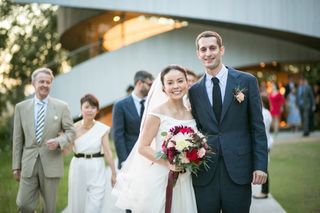
Sarah and Chris at their wedding in Hiroshima in 2017.
They pumped dye into my uterus and fallopian tubes. I thought, This is excruciating pain, and if pregnancy is anything like this, I don't know if I can do it. Afterwards, the doctor said, "You know, it was very weird. I could be mistaken. You should get it verified with an MRI, but I only saw one fallopian tube."
Stay In The Know
Get exclusive access to fashion and beauty trends, hot-off-the-press celebrity news, and more.
I don't know why, but I didn't think it was such a big deal; I just took the paper and went back to the office. Halfway through the day, I was in excruciating pain, and I just started sliding down the chair. I realized, Oh my God, I need to go home.
I left the office and was trying to hail a cab, and I collapsed. I was still conscious, but I was lying on the sidewalk. I managed to call [M.M.LaFleur Chief Creative Officer] Miyako [Nakamura], and said, "You’ve got to come get me." Three of my executives got into an ambulance with me. And I still remember one of my executives was holding my hand so tight. He told me, "You're going to be okay, you're going to be okay," and it was just... I think about it now, and I just don't know that many co-workers who will ride in an ambulance with you.
At the ER, the doctor said, "[What your doctor told you earlier] is a called a unicornuate uterus, and it's very rare. And it's often associated with infertility. So you probably want to follow up with someone about that." It was so strange to hear that from an emergency room doctor.
The months that followed that were pretty scary. All I heard was “unicorn.” So I was like, "I have a unicorn uterus." But what it essentially means is you've got half a uterus and one fallopian tube.
That was the moment when this "fertility journey" started. I was now part of the group of less than 0.2 percent of women who have a unicornuate uterus. It's kind of funny, because everyone was like, "You're fine, you're healthy. Why would you have problems getting pregnant?" And I discovered myself in this very, very surreal situation.
One of the biggest worries with unicornuate uterus is that you could get pregnant, but you tend to miscarry a lot in the second trimester or third trimester and have very early deliveries. The neonatal specialist we spoke to explained, "The question is, do you even want to get pregnant? It seems to me like you aren't going to be able to carry to full term anyway, even if you got pregnant. You might want to consider other options."
So basically, off the bat, we started thinking about surrogacy. We had a conversation with another fertility clinic in Connecticut, because New York state didn’t allow paid surrogacy. I think what made us think twice initially was that it's such a big thing to bring this third person into a part of your life that's so personal. We talked about it a lot, and we decided to try getting pregnant on our own.
Everyone was like, "You're fine, you're healthy. Why would you have problems getting pregnant?"
I actually got pregnant in December. I was peeing on that damn pee stick every single day, and I was like, "I saw a line!" and I was so excited. Later, I was having lunch with a friend of mine, and our thing was usually to have wine during lunch; that was our greatest indulgence. But that day, I was like, "Oh no, I'm not feeling well, so I'm not going to have wine," and I felt like that was my first pregnant person thing that I’d done.
On my way back to the office from lunch, I could feel my period coming on. Some light bleeding is normal in the beginning of pregnancy, but as the hours went on, I kept bleeding more. I was like, "Oh, I know that this isn't it."
I think that happened twice or three times: I would get pregnant, but immediately miscarry—a chemical pregnancy. I remember two instances when I could feel the miscarriage happening, and both times, I was in the office. And there were these moments when it was like, do you get up and leave, or do you just stay? And I was like, I'm think I'm just going to stay. Probably the most natural thing would be to just... I don't know, go home, maybe?
I held on to those pregnancy tests for some reason. I mean, not for some reason. I now know why. I held on to them for three years, because it was somehow proof that I could get pregnant even if it wouldn't stick.
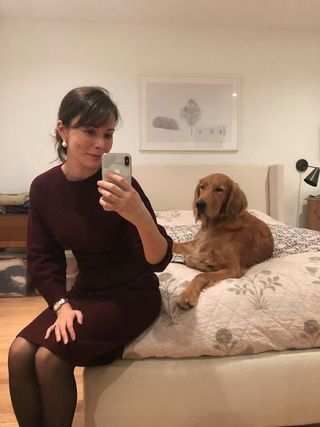
Sarah during a round of IVF.
After that, we moved into IVF. I switched to Fertility Clinic #2 because I met a doctor there that I really loved. I started with her, and I did the first IVF cycle in February 2018, but they weren’t able to retrieve that many eggs. They got seven, but only four fertilized. The embryologist is checking in every single day; it's like you're getting a report card: "Okay, we got nine." And then the next day, it's down to seven. The next day, it's down to six. By the end, you're praying that there's one viable embryo left.
Ultimately, three came back genetically normal. We transferred the first and that failed.
The doctor said, "You said you have cramping during your period—I think you might have endometriosis." Sally Rooney's book Conversations with Friends was the first time I'd really learned about endometriosis. I knew so little about it. I remember my doctor saying, "There's very little that's known about endometriosis, because there isn't that much funding that goes toward women's health and women's reproductive health." The only way you can truly find out if you have endometriosis is by doing laparoscopic investigation. But she was like, "Before that, there's a test that you can do; it's very Wild Wild West."
I did that test and it came back positive, and so she was like, "Okay, you probably have endometriosis, so let's treat that. But before we treat that, why don't we do another egg retrieval?" So I did another egg retrieval.
I held on to those pregnancy tests for some reason. I mean, not for some reason. I now know why.
The doctor told me, "You could either do the laparoscopic surgery, or we can inject the prescription Lupron Depot and shut down your reproductive system for two months, which could suppress the endometriosis. And then we would do a transfer immediately after you finish." I asked which one she would do, and she said the surgery would take me out from work for two weeks, “so it feels like it's easier if you start with the Lupron Depot." "Easier" I put in quotes, because basically what it does is puts your body into menopause. I had crazy hot flashes. Hottest summer I've ever had. You experience a lot of vaginal dryness; I had a lot of headaches. This was supposed to suppress the endometriosis, but we tried another transfer, and the same thing happened; it didn't work. At that point, she was like, "I don't know what's wrong. The embryos are good quality, and we ‘addressed’ the endometriosis problem."
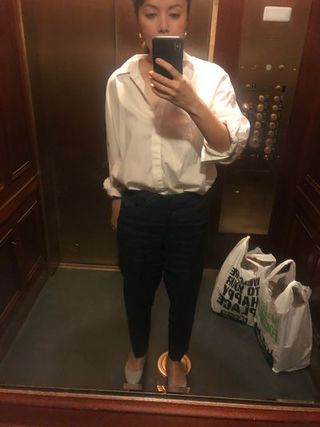
Sarah takes a selfie as she starts a new treatment with Lupron Depot.
She asked the head honcho of Fertility Clinic #2, "What would you recommend?" And apparently the consensus was that surrogacy was my best chance.
My doctor said to me, "There's an even deeper Wild West—there's some autoimmune stuff that you could try. This is really unproven science. This isn't something we do, but there are a couple of doctors. And it's hard for me to even recommend it. But if you want to continue trying, that's your next step." In the meantime, I'm doing acupuncture twice a week, taking vitamins, all of that.
These other doctors said I definitely had endometriosis, and should have laparoscopic surgery. "And then we're going to start to do IVIG, a type of blood transfusion, or, if your body is receptive to the cheaper drug, intralipids, which will be injected into your body via IV."
Of course, because this is the Wild West, neither treatment would be covered by insurance, and for IVIGs, we were talking about $3,000 per treatment per week, possibly over the course of multiple weeks. This is on top of the 10 other vitamins and drugs I was or would be taking, most of which I’d never heard of before: CDP-Choline, fish oil, NAC, iron, prenatal vitamins, probiotics, vitamin D, vitamin E, Homocysteine Resist, Ecotrin, Metformin, Prednisone, Lovenox.
It was just escalating. And I remember, I kept seeing this doctor because I felt like, Oh my gosh, this is my last hope. I remember seeing my psychiatrist at the time—my psychiatrist really never gives me her opinion. She's very good that way. But I remember her saying to me, "You're starting to do things that seem way beyond the scope of what you were ever intending to sign up for." And it's true. You kind of get tunnel vision. You just keep doing, doing, doing, doing, without really stopping to think. And I remember her saying to me, "Your intent was always to have a family. Not to get pregnant. Don't lose sight of the bigger goal here."
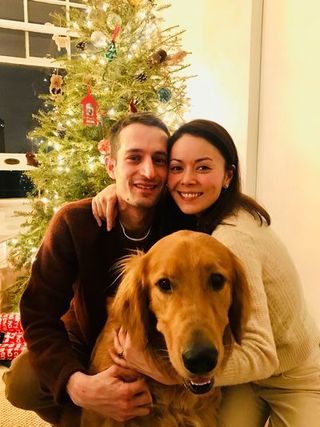
Sarah and Chris with their dog Ruggles.
I was really not in a good place then. It had been a tough year business-wise. I felt like the company needed so much of my attention and my energy. And at the same time, if I looked at my calendar, almost every single day was some sort of doctor appointment. So it was like, okay, I've got like, seven hours of doctor's appointments this week, and I'm also trying to get this company back on its trajectory. I went back to Japan to see my parents for the holidays in December 2018, and I just kind of crashed.
My sister lives in Tokyo, and she went to see this fortune teller. And the fortune teller said, "You have an older sister with a bad uterus." So my mom was like, "We’ve got to go see this fortune teller." I was in such a discombobulated place, I didn't even know what my questions were. She asked, "What do you want to know?" And I said, “I guess I want you to help me figure out how I keep running my company with all the energy that's required, and then also figure out this fertility thing." And she responded, "So I think you're asking me what your priorities should be."
"Your intent was always to have a family. Not to get pregnant. Don't lose sight of the bigger goal."
So she started to lay down her cards—four cards that formed a diamond shape. And she opened the fourth priority, and she said "The fourth priority, that is your work. That is your career." And I was like, "That's number four? Crazy, because that's all I do in my waking hours."
And then she said, "Number three: That is your fertility challenge." And I said, "That's number three? What the hell are two and one?" "Number two's your husband." And I was like, "My husband? My husband and I are just fine." And it's true. I think fertility…I know it can be really hard on the relationship, but for us, it only brought us closer together because I felt like I had so few people to talk to about it. And she said, "Well, maybe it's more broad then. Maybe it's your family, your friends. Maybe it's your relationships." I was like, "Okay, I guess that sounds right." And I thought, Well, I have no idea, then, what number one could be. Which, I sound so stupid when I say this now, but at the time, I thought, I wonder if it's world peace.
She opened card number one. And she said, "And number one... Number one is you."
I wish I could say that was the moment when I reached some new level of wisdom and decided to stop. But it's not true. I came back in January 2019, and I was scheduled to do my first transfusion. You do it at a chemotherapy center and they ask you to block out five hours during the middle of the day. And the day before, I was trying to reorganize my calendar, because I'm like, Oh my God, I have to find five hours somewhere, how do I do this?
And I realized, it doesn't fit. There's no way. I just cannot cram all these hours into a calendar. Which is actually such a metaphor for the broader things at play. So I canceled the appointment. And I remember the woman being like, "Oh are you going to reschedule? Do you want to look at next week?" And I said, "Nope, not going to look at next week. Never going to do it again."
That was when I called it quits. I also canceled the laparoscopy, and I spent the rest of the year not doing fertility, which was really what I needed. I said, "Okay, let's see if there's someone else who's willing to help us have a family." We thought about adoption for a while, and I still think at some point I would love to, but adoption has become quite hard, too.
I reached out to a girlfriend who I didn't really know all that well in college who had gone down the path of surrogacy, and she was so, so generous. There's definitely a sisterhood of women going through infertility, where there's a no-holds-barred, you-will-tell-every-piece-of-information-if-it's-useful [understanding]. So suddenly surrogacy, which up until that point, I’d thought, Well, that's just one step too far—that really helped me get over that hump.
We found an agency, and the third person we matched with was Trisha. She has twin girls of her own. She is a medical professional working in a hospital. They live two hours outside of Minneapolis. There was something about the way she wrote about herself and her life, I knew, "Oh my God, she's the one."
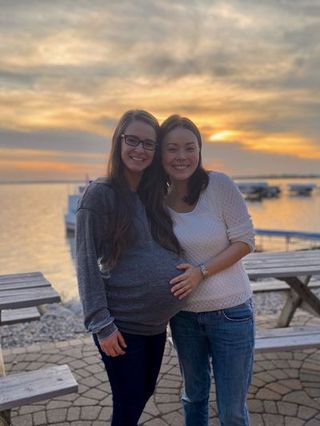
Sarah and Trisha before the twins’ birth.
We had the first call over Zoom. You get into all these really tricky conversations. Like if you found out that your baby had Down Syndrome, for example, would you want to have an abortion? This is literally the first conversation I'm having with this person, and you talk about the hardest things first. Just the most sensitive topics you probably don't even discuss with some of your closest friends.
We were very much on the same page, and what she said was, "As far as I'm concerned, this is not my baby. This is your baby. And I'm taking care of it for you in the meantime. So you tell me what you want to do with the baby."
And to be honest, that's the way I felt throughout. I really felt like she was this incredible person who had signed up to take care of our baby. Her husband, Mason, was so amazing, he was like, "She said she wanted to do it, and I support her in whatever she does." He was just so chill about it.
At that point we had five embryos left, and we had one really good one. So I flew out to Minneapolis. It was a super snowy day in December 2019. We did the transfer, and I was holding her hand. Mason was there, too. All of us got so emotional and teary-eyed, because we realized the gravity of what this person is willing to do. I really can't think of a bigger gift.
All of us got so emotional, because we realized the gravity of what this person is willing to do.
Everything went smoothly. The embryo is transferred, everyone goes home, and then you wait for 10 days. The morning she was going in for the blood test, I texted her, "Trisha, I hope you know, whatever happens, it's going to be okay.”
The doctor's office called me, and they were like, "Unfortunately, it didn't work." It was a shocking moment. Because at this point, we’re two-years-plus in, and you think this is the final frontier, it's this option that's going to work. But then it doesn't. I remember being on the phone with Trisha, and she was in tears. And at that point it just re-confirmed for me the gravity of what you're asking someone to do. Because she's not just on the physical journey, she's really on the entire emotional journey, and she's so upset that she can't get pregnant for you.
Weirdly, I was disappointed, but prepared. I don't know how to describe it, but I think after being through so many rounds of things not working, you enter this new realm of "I am prepared for all disappointment." So, surprisingly, emotionally, I was okay. On the financial front, we'd spent a ton of money. We're entering six figures now. So much of our savings has gone into this process. And every time you do an IVF transfer with a surrogate, you're paying more.
It had been more than a year since I had stopped doing IVF myself. So simultaneously, I went back to my doctor and said, "One last time, and I want to try it with Lovenox," which was a drug a girlfriend who successfully got pregnant after infertility struggles told me about. And the doctor was like, "Okay, the science there is really unproven. We can try it, but I wouldn't bet on it." I've met very few doctors like her. The perfect mix of science and compassion. She really knew her stuff, and always walked me through the likelihood. But she also was game to try something new, and you could feel that she wanted this for you almost as much as you did for yourself.
We did the transfer in December 2019, and miraculously, that's the one that ended up working. But, because I'd had so many miscarriages, I was like, "This is probably also not going to work, so let's keep going with surrogacy." I was like, "If we can end up with one baby after trying all these different things, then I would be so, so happy."
So the new year came, and Trisha said she wanted to try again with two embryos this time, not one. We talked to our nurse in Minneapolis, who spoke with our doctor, and she came back and said, "These embryos are both not great quality, so sure, try with two." And we said, "Is there any risk of twins?" And our nurse passed on the doctor’s message, which was, "No. The quality's so low. It's not going to happen. Don't worry."
So we transferred those two embryos in January 2020. And then she did her blood work 10 days later, and the nurse called: "She's pregnant. And not only that, her HCG is through the roof. So you might have twins." And we were like, "What the?!"
At six weeks, you go in to see if there's a heartbeat. She videotaped it for me. There were two heartbeats. That was right before we went into lockdown.
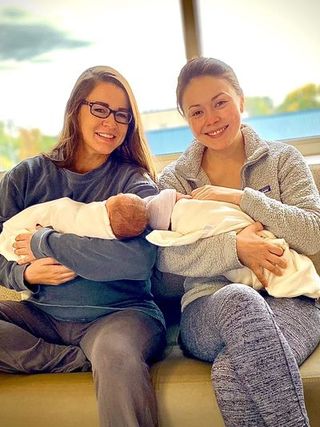
Trisha and Sarah in the hospital with the newborn twins.
I remember that moment. I was like, Oh my God, this is what people mean when they say they're on Cloud 9. We're having two babies, and maybe if I stay pregnant, maybe there's a third. But I didn't tell anybody. Chris and I didn't even tell our parents. We didn't tell a soul.
Around that time, we had this campaign at M.M.LaFleur that went viral. The Ready to Run campaign, where we said would dress any woman running for political office. We had all these press opportunities coming in, but a lot of it was on TV. And I'm trying to hide my pregnancy, because I really don't want to disappoint anyone—or myself.
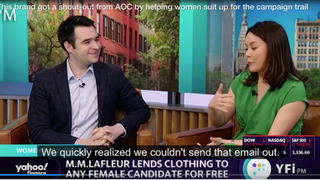
A pregnant Sarah appearing on TV to promote the Ready to Run campaign.
Each week, I'm checking what is the rate of miscarriage this week, even though I know it doesn't apply to me, because for me, the chances of miscarriage continue on basically until the very end. It felt like I had to be careful not to get too attached.
Trisha getting pregnant was this big relief for me, because I thought Okay, even if I miscarry, we still have two others, and maybe one of them will work out. Just this constant of not getting too excited about anything.
I told Trisha I was pregnant before she did the second cycle. I felt like she signed up to carry a baby for a couple who couldn't get pregnant, and so I didn't want her to feel like I had misled her. And so I told her, "I'm six weeks pregnant, and it's still really early and may not work out, but I just wanted you to know that before you did the second transfer in case that changed your mind." And she was like, "Oh my God, that's so amazing. Congratulations."
She was the most wonderful partner through it all. I had planned to fly out for all these different appointments, but I couldn't because of COVID. So all of our appointments, she would ring us on FaceTime, and Chris and I got to sit in on all of them. I got to know her amazing family, and she has these twin girls who are just the cutest. It was this amazing friendship.
When I crossed the 30 week mark I realized, Okay, I actually might have this baby. I was induced at 39 weeks, which blew all my doctor's wildest expectations. It was an emergency C-section, because the cord was wrapped around his neck three times. But the Mount Sinai doctors and nurses were so incredible; I'd never experienced that level of care. Kento was born in August at 7 pounds, 14 ounces.
I gave birth, and then six weeks later, we flew out to Minneapolis to get ready for the twins’ delivery. Trisha had delivered at 35 weeks with her own twins, so we thought the babies would come around then, but these babies did not want to come out. She had to be induced at 37 weeks and ultimately had a C-section. I got to be there for the birth of the twins. Theo was 6 pounds, 0.9 ounces and Astrid was 5 pounds, 13 ounces, born in September, seven weeks after Kento. It was one of the most surreal experiences of my life—watching your babies be born out of someone else's body.
The C-section thing is a whole other topic I feel like women don't talk about enough. C-section is the hardest thing I've ever done. I didn't realize: I couldn't even laugh, I couldn't move. It’s major surgery. In my mind, you're Kate Middleton, and you appear five hours later with perfectly coiffed hair. After you have a C-section, the nurse needs to be there when you pee for the first time without a catheter. They bring you to the toilet, and they're literally standing there watching you as you try to pee. It's so unglamorous. I thought I had peed, and I looked down and it was bright red. I was like, "Oh my God, I've peed blood. I'm dying." And she said, "No, no, that's what's supposed to happen." But none of this, nobody talks about this. That brought home the gravity of what we'd asked Trisha to do. She had her stomach opened for us.
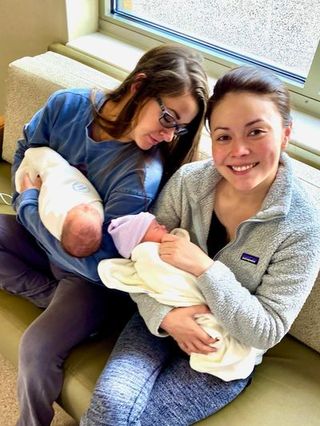
We never made a big announcement when I got pregnant, or when Trisha got pregnant, even after we crossed the 12-week mark. We never did an Instagram post, I think partly because I was so nervous and I remember the way I felt when I saw other people's baby bump photos. And I just decided I didn't want to do it, even though I'm now on the other side.
Some people are like, “life has completely changed since I gave birth or I had children.” I don't feel that way. We just decided to shift the kind of life we were having. But I really loved my life before too. I think that’s also part of the challenge with infertility—to keep recommitting to these things that are so physically and emotionally and financially taxing when you were also happy before.
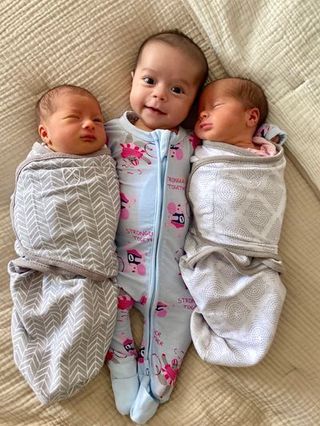
The triblings.
But now the three of them are just so fun. That’s the word that comes to mind. We call them "triblings" because they're something between "triplets" and "siblings." When we were leaving the hospital with Trisha, we joked that we were going to get a lot of questions about the relationship among the three babies, and that we'll just have to say "triplets" to avoid explaining the whole story. But I find that today, even now when the three of them are pretty much the same size (and actually Theo is bigger than Kento), when people ask me on the street if the three of them are triplets, I go out of my way to tell them that they're triblings, because I think that's part of our story, and I never want to forget the gift that Trisha gave us.
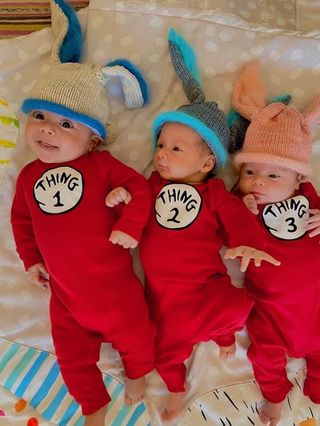
One thing that's also been really nice for me is, professionally, I could spend all day long thinking about my job, but there are just some basic needs that have to be met: They need to be fed, they need to be changed. It allows me to switch my brain and create some healthy boundaries.
One of my mentors is Shira Goodman, who used to be the CEO at Staples. I was trying to figure out whether or not I should take maternity leave and she said to me, “You worked so hard for this. You should really enjoy it.” It was so nice to hear her say that. I actually really enjoyed it, even though we weren't sleeping. After three months I was ready to go back. The twins were only six weeks old, but I felt like a part of me was kind of missing. When I went back to work, I was like, “Oh my God, I feel like myself again.” But they are just pure joy. I don't know how else to describe it.
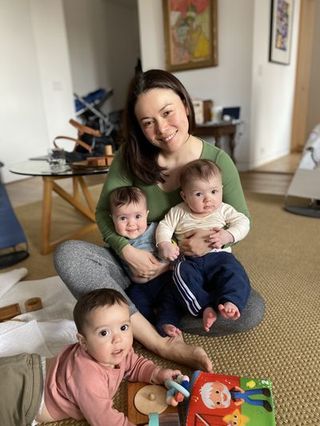
Sarah and the triblings.
The reason I wanted to share my story is that I wouldn't have babies today were it not for the people who were willing to talk to me about their journey. It was, emotionally, the loneliest thing I've ever done, so I hope people feel a little less lonely.
The second part is, I'm not looking for any sort of sympathy, but compassion around how hard the fertility process is. And especially when you're trying to run a company and the Silicon Valley attitude is, “if you're not working every waking hour then are you even really serious about your business?” I found myself in this kind of impossible position where I couldn't outsource anything. In the startup world, you're always trying to optimize and outsource. I think the very real thing with fertility is you are the only person who can do it. And so it's incredibly physically and emotionally taxing.
The last thing is, financially, it is the costliest thing we've ever done aside from buying our house. We were able to afford it. But some people mortgage their houses to be able to afford IVF and surrogacy; for most people it is completely out of the realm of financial possibility. Some parts of IVF are covered by insurance. Nothing in surrogacy is covered by insurance. And you have to think, especially with same-sex couples and infertile couples, having children—is it a right? Or is it a privilege? I'm a huge advocate of insurance covering surrogacy, but we're so far from that conversation. If we really want our society to keep having kids and we also want women to keep working, this is a really serious conversation that we need to have.
Sarah LaFleur is the Founder & CEO of M.M.LaFleur. Sarah founded M.M.LaFleur in 2013 with a mission to help women take the work out of getting dressed, so they can focus on the work that matters to them. Prior to founding M.M.LaFleur, she worked at Bain & Co. in New York and TechnoServe in South Africa. Sarah sits on the board of International Rescue Committee's Airbel Impact Lab and on the business advisory council of the New York Fed. She graduated from Harvard University. M.M.LaFleur is named after her mother, whom she calls her biggest inspiration.
RELATED STORIES
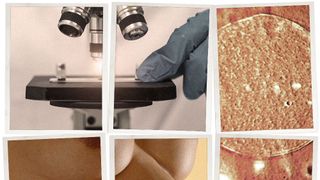


Sally is the Editor in Chief of Marie Claire where she oversees coverage of all the things the Marie Claire reader wants to know about, including politics, beauty, fashion, and celebs. Holmes has been with Marie Claire for five years, overseeing all content for the brand’s website and social platforms. She joined Marie Claire from ELLE.com, where she worked for four years, first as Senior Editor running all news content and finally as Executive Editor. Before that, Sally was at NYMag.com's the Cut and graduated with an English major from Boston College.
-
 Zendaya's Custom Wimbledon White Is Back With a Vengeance
Zendaya's Custom Wimbledon White Is Back With a VengeanceThe motif from her 'Challengers' era returns for awards season.
By Halie LeSavage Published
-
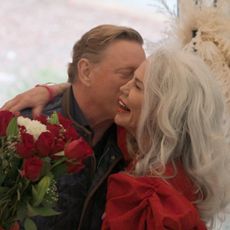 Two of ‘The Later Daters’ Found Love on the Netflix Dating Show—Are the Couples Still Together Today?
Two of ‘The Later Daters’ Found Love on the Netflix Dating Show—Are the Couples Still Together Today?Here's what we know about the stars' love lives post-filming.
By Quinci LeGardye Published
-
 There's Still Time to Snag Katie Holmes's Favorite Minimalist Bags for Under $250
There's Still Time to Snag Katie Holmes's Favorite Minimalist Bags for Under $250Celebrities can't resist this brand's minimalist vegan leather designs.
By Hanna Lustig Published
-
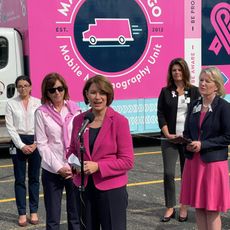 Senator Klobuchar: "Early Detection Saves Lives. It Saved Mine"
Senator Klobuchar: "Early Detection Saves Lives. It Saved Mine"Senator and breast cancer survivor Amy Klobuchar is encouraging women not to put off preventative care any longer.
By Senator Amy Klobuchar Published
-
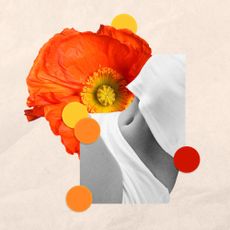 I'm an Egg Donor. Why Was It So Difficult for Me to Tell People That?
I'm an Egg Donor. Why Was It So Difficult for Me to Tell People That?Much like abortion, surrogacy, and IVF, becoming an egg donor was a reproductive choice that felt unfit for society’s standards of womanhood.
By Lauryn Chamberlain Published
-
 The 20 Best Probiotics to Keep Your Gut in Check
The 20 Best Probiotics to Keep Your Gut in CheckGut health = wealth.
By Julia Marzovilla Published
-
 Simone Biles Is Out of the Team Final at the Tokyo Olympics
Simone Biles Is Out of the Team Final at the Tokyo OlympicsShe withdrew from the event due to a medical issue, according to USA Gymnastics.
By Rachel Epstein Published
-
 The Truth About Thigh Gaps
The Truth About Thigh GapsWe're going to need you to stop right there.
By Kenny Thapoung Published
-
 The High Price of Living With Chronic Pain
The High Price of Living With Chronic PainThree women open up about how their conditions impact their bodies—and their wallets.
By Alice Oglethorpe Published
-
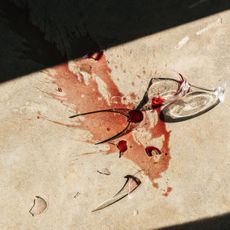 I Used to Imagine Murdering the Men I Dated
I Used to Imagine Murdering the Men I DatedFalling in love helped me finally figure out why.
By Jessica Amento Published
-
 60 Workout Apps for Women Who Want Results (Without a Gym Membership)
60 Workout Apps for Women Who Want Results (Without a Gym Membership)Easy fitness plans you can follow without fear of judgment.
By Bianca Rodriguez Published